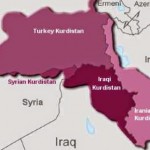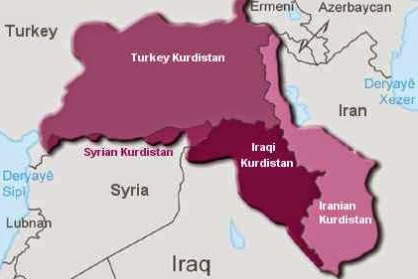The Kurdish issue is far more complex and sophisticated than the simplistic nationalist rhetoric, made fashionable by Europeans–and which all actors in the game feel compelled to employ and have us believe.
From the Turkish perspective, first, some background. Turkey has the largest number of Kurds in the world — 13 to 14 million in 2013 or 17.7% of the total population of Turkey.[1] Turkey’s economic boom extended investments into the formerly neglected Kurdish regions in Turkey’s south east.
Second, starting from the 1990s, large numbers of Kurds from these regions moved to the big cities in western Turkey, escaping the military conflict between the Kurdistan Workers’ Party (PKK), the Kurdish guerrilla organisation, and the Turkish army. By being included and benefiting from the economic boom, the Kurds, together with other rural migrant groups in the cities, formed the backbone of the emerging urban middle classes.
The new drift in Turkish society also marked a departure from the repressive policies of previous military and militaristic governments against the Kurds, dating back to the early days of the Turkish republic in the 1930s. These policies were immersed in suspicions on the part of the republican elites that Kurdish populations–especially the Kurdish elite–could be open to manipulation by European powers with strong interests in the oil resources of the region. This had happened with the Arabs and it defined the tenor of Turkish policy regarding different groups in the former Ottoman territories in West Asia.
Now, in relation to the Kurds, the republic continued with the Ottoman policy of elite integration–prominent Kurdish families would invariably have one of their own members in the Turkish parliament from each political party– leaving the rest of the population in the countryside at the mercy of a few leading families, belonging to major tribes and religious tarikats (sects).
The dislocations of the 1990s changed this picture, with large numbers of Kurds joining the urban middle classes since the early 2000s. Indeed, the recent election had nearly 45% of the Kurds voting for Erdogan’s party, which was responsible for the economic boom, 2000 on.
It was Erdogan too who took the initiative in 2013 to start the process of resolving the Kurds’ problems. The military coup in 1980 had curtailed their political freedoms, which they now came to enjoy. This culminated in the establishment of the People’s Democratic Party (HDP) or the Kurdish political party, which acquired 13% of the vote in 2014, with support from the Turkish left.
There were two aspects to the solution that the Turkish government devised. One, it did the unspeakable: talking to PKK leader, Abdullah Ocalan, imprisoned in Turkey for terrorism that had collectively killed about 30,000 people. The government’s policy targeted the de-militarisation of the PKK.
The second aspect was including Masoud Barzani in the coalition with middle-class Kurds in Turkey. Barzani was the leader of the Kurdish Nationalist Party whose family had been at the helm of the Kurdish nationalist movement in West Asia with the blessing of the U.S. In the post-Cold War era, Barzani and his armed forces, the peshmerge, provided the main support for the American presence in northern Iraq since the Gulf War, controlling 40% of Iraq’s oil reserves—an estimated $45 billion worth of exports (around 600,000 bdp).[2] There was American and Israeli involvement in northern Iraq throughout the 1990s, ostensibly building civil society through NGOs– and finally culminating in the establishment of the Kurdish Autonomous Region following the U.S. invasion in 2003. The American-occupied administration of Iraq made possible transfer of oil-rich lands to the Kurds, in which Saddam Hussein had settled with the Sunnis in the 1970s. This contributed to Sunni discontent, leading up to the creation of Daesh.
The Turks endorsed American support for Barzani and his peshmerge in the 1990s. After the formation of the Kurdish Autonomous Region in northern Iraq, Erdogan helped Barzani strengthen his position vis-a-vis the Iraqi government of Nouri al-Maliki (prime minister of Iraq from 2006 to 2014), by providing an outlet for northern Iraqi oil notwithstanding protests from the Iraqi central government that it was unconstitutional and the central government was entitled to a share in northern Iraq’s oil revenues.
For Turkey, the alliance with Barzani was a good deal, providing it with a steady flow of much needed oil and a lucrative export market for Turkish goods and investments, especially in construction: infrastructure and housing.
This happy state of affairs was disrupted in 2014 with increased American involvement in Syria and the American alliance with the PKK, and its Syrian extension, the Popular Protection Units (YPG). There is much hair-splitting about whether the YPG is different from the PKK, which is on the international list of terrorist organisations. Suffice it to say, that since the 1980s, given the massive Turkish military presence in the south east part of the country (occupied mainly by the Kurds), PKK activity in Turkey has been conducted from Syria, where its cadres have been stationed. The PKK was an actor in Syrian politics, both among the Syrian Kurds, and also provided President Bashar al-Assad (Esad) a card to be used against the Turkish government.
After 2014, with the increased prominence of religious groups, especially the Sunnis, the rise of the Daesh in the opposition and the war against Assad’s government in Syria, American policy in Syria turned to the PKK and YPG, cultivating them as the main force in the fight against the Daesh and transferring highly sophisticated weapons and personnel to assist them.
In Turkey, this meant an end to the PKK’s commitment to Erdogan’s peace process and an escalation of the party’s terrorist activities in the country, both in the Kurdish regions in the south east, and in the major cities, including Istanbul. The Turkish army responded with equal fervour. The PKK saw an opportunity here to be restored to its former position as the single representative of the Kurds in Turkey and chose to abandon Erdogan and the option of playing second fiddle to Turkey’s middle class Kurds.
This was also part of what brought about Turkey’s near alienation from the western alliance and its turn to Russia. This is a saga that begins with Turkey’s across-the-border military advances into Syria to fight Daesh — in an attempt to retrieve what was perceived to be a lost position in the western alliance against Daesh while simultaneously fighting the PKK-cum-YPG, supported by the Americans. The upshot of this was a rift in Turkey’s relations with the U.S. Turkey insisted that the U.S.and the West turn to NATO, and thereby to it, Turkey, in the fight against Daesh, and not to a terrorist organisation, providing arms to the PKK to use against it.
Also underway is a parallel deterioration in relations with Germany, another NATO ally and major trading partner. Germany is withdrawing its forces from Incirlik, a NATO airbase, and continuing its support for the PKK: there are a considerable number of PKK members and sympathisers in Germany and in other western countries, who migrated there in the 1900s.
On the northern Iraqi side, Barzani’s forces were a major presence, often fighting Daesh with Turkish support. It is relevant to note here that Barzani has been uneasy about the rise of the PKK in Syria and the party being the recipient of great favours from the U.S., its main mentor. The fact is that there has also been American support for the Gorran Movement, an opponent to Barzani, which did not vote in favour of the referendum.
Finally, Barzani allowed the PKK’s presence in Kandil, the mountainous region, 200 km from the Turkish border, since 1998, enabling it to organise its activities in Turkey and Iran from there. After 2015, Barzani, feeling unsettled by the increased power of the PKK in Syria, severed relations with its leadership in Kandil, choosing instead to support the Turkish forces fighting the PKK.
Looking at this intricate web of politics, one might conclude that Barzani may have held the referendum, not necessarily to have it lead to the formation of an independent Kurdish state in northern Iraq, but primarily to show the new American administration who is boss in the current murky state of Kurdish politics. Or to re-assert his and his family’s historic claim to the leadership of the Kurds and of Kurdish nationalism.
It’s a claim that the Barzani family has made since the Cold War. Barzani’s father was a loyal friend of the CİA and the U.S. government and he could not let that position be appropriated by the PKK, which had ties with the Soviet Union during the Cold War and is a new recruit to the western alliance.
The Turkish government is probably aware of what Barzani was trying to do. It is obvious that Barzani does not want to disrupt his many-sided relationship with Turkey. It is not likely to be significantly altered, especially not in terms of trade flows, despite the much publicised movement of Turkish troops along its border with northern Iraq, joined by Iraqi central government troops.
On the other hand, Erdogan, the master politician, is appeasing the rising nationalist sentiment within Turkey following the referendum, threatening a surprise attack on Iraq on the northern side. In doing so, he is asserting Turkey’s leadership position in the region, seeking to ensure the security of the Turkmens and other groups in Kerkuk, a major city, and that the PKK will think twice if it is jumping on the nationalist bandwagon, and contemplating any move toward declaring autonomy in Syria.
At the same time, with little support from the western alliance, the Turkish government is also trying to establish ties in the region with Iran, with a large Kurdish population that is threatened by both Barzani’s move, the PKK and the Iraqi central government.
There is much that bears watching in the coming months: the struggle for leadership among the Kurds, how this struggle will play out in Turkey’s relations with the West (the U.S. and Germany) and what this implies for the West in terms of its relations in the oil-rich West Asia region. It will also be interesting to observe the impact it can have on Turkey’s economic and political relations, which are increasingly looking to Russia, and further eastward to India and China.
It also remains to be seen whether the region will be caught up in nationalist rhetoric, encouraged by the big powers, which, in the past, did not serve the people of West Asia, causing nothing but bloodshed. Or will it return to the sophisticated pattern of alliances and sub-alliances, transcending national, ethnic and religious lines, and speaking to the survival instincts of the regional actors? The latter, which prevailed briefly 2010 onwards, appears to have been bypassed by big-power politics for the time being. One can only hope for a return to politics which is the way of sanity for the region and its people.
Huricihan Islamoglu was a Visiting Fellow at Gateway House. She is a Professor of Economic History at Bogazici University, Istanbul, Turkey and a Senior Fellow, Institut d’Etudes Avancees de Nantes, Nantes, France.
This article was exclusively written for Gateway House: Indian Council on Global Relations. You can read more exclusive content here.
For interview requests with the author, or for permission to republish, please contact outreach@gatewayhouse.in.
© Copyright 2017 Gateway House: Indian Council on Global Relations. All rights reserved. Any unauthorized copying or reproduction is strictly prohibited.
References
[1] Konda Research and Consulting, Turkey
[2] Brew, Gregory, “Who Controls TheOil As Kurdish Independence Looms?”, Huffington Post, 21 June 2017, <http://www.huffingtonpost.com/entry/who-controls-the-oil-as-kurdish-independence-looms_us_594a80fbe4b0c24d29f47907>



